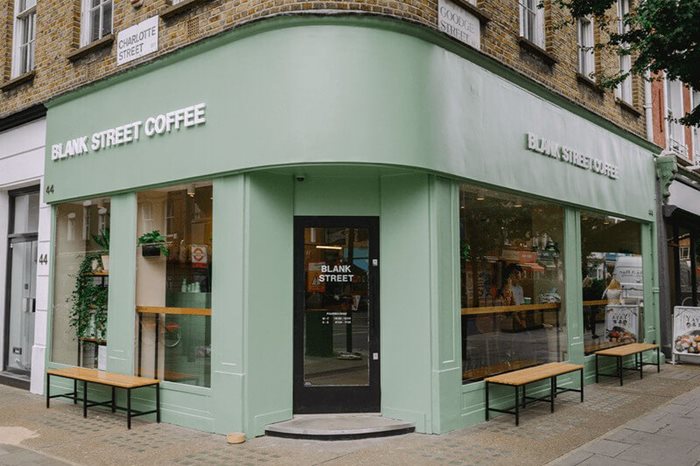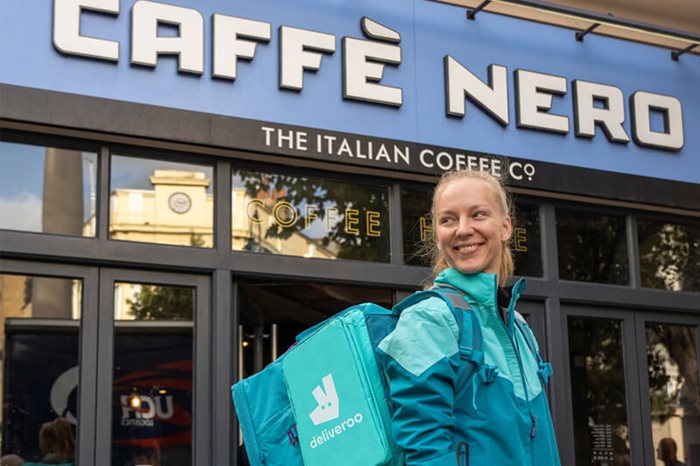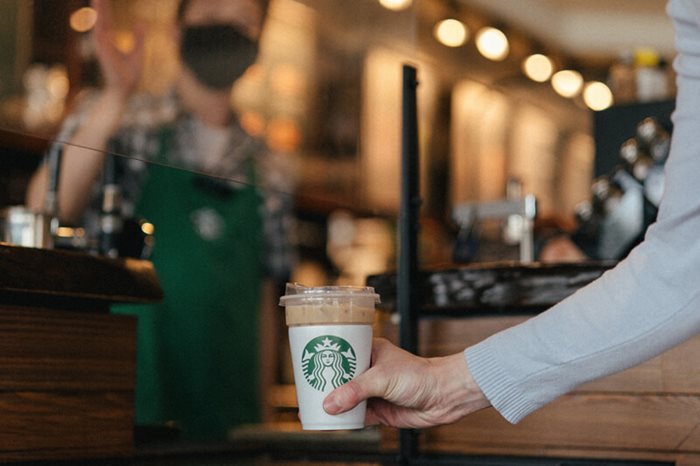The £4.9bn ($6bn) UK branded coffee shop market achieved 11.9% sales growth over the last 12 months, expanding 4.4% to reach 9,885 outlets. However, operators are grappling with inflation, soaring energy costs and changed consumer footfall. Exclusive data from Project Café UK 2023 examines the key dynamics shaping Europe's largest coffee chain market

Photo credit: Julia Sabiniarz
Despite an incredibly challenging trading environment following the pandemic, strong sales and outlet growth demonstrate the enduring appeal of coffee shop culture in the UK, with consumers viewing out-of-home coffee as an affordable luxury during the cost-of-living crisis.
With major operators investing in convenience formats and automation playing a greater role in both back and front of house operations, the UK branded coffee shop market looks set for further transformation following the upheaval of the pandemic. Here are five factors shaping UK coffee chains in 2023.
1. Inflation and the cost-of-living crisis
Although many major UK coffee chains are close to or have exceeded pre-pandemic trading levels, inflation and dampened consumer confidence due to the soaring cost of living pose major challenges for operators in 2023. Rising costs, supply chain issues and staff recruitment were cited by industry leaders surveyed by World Coffee Portal as the top three challenges facing their business following the pandemic.
Increased overheads have compelled major UK coffee chains to increase beverage prices by up to 16% over the last year. With consumers already absorbing price rises, particularly for groceries, operators will need to tread carefully when addressing inflation, whether through raising prices or reducing beverage volume – most UK consumers surveyed in Project Café UK 2023 agree that a price rise is preferable to paying the same for less.
Similarly, just 26% of consumers surveyed agree the price of a cup of coffee is more important than quality, compared to 44% who disagreed.
However, despite inflationary pressures prompting all major coffee chains to implement price increases over the last year – with the average price of a 12oz latte increasing by 11.3% (£0.33p) to £3.25 ($4) – overall rising sales indicate UK consumers still consider out-of-home coffee an affordable luxury even as disposable incomes tighten. Most consumers surveyed (36%) believe coffee shop beverages represent value for money, compared to 30% who were neutral and 30% who disagreed.
Some coffee chains with a premium focus are also responding to the cost-of-living crisis by introducing value-focused menu ranges. In January 2023, food-to-go and coffee chain Pret A Manger launched its lower-priced Made Simple sandwich range, which is around 45% cheaper than its standard sandwich menu. The chain has also introduced its Coffee Savings Calculator as a marketing tool to promote its coffee subscription service.
Meanwhile, food-focused market leader Greggs has benefited from its value proposition, reporting strong revenue and outlet growth in 2022 and forecasting sustained sales momentum in 2023.
McDonald’s McCafé concept also trades on value and often markets itself as a cheaper alternative to established coffee-focused chains.
The soaring cost of energy is another major headwind facing UK hospitality businesses in 2023. According to advocacy group UKHospitality, hospitality businesses in the UK saw energy prices rise by an average of 238% in 2022, with energy costs rising as a percentage of turnover from 5% to 18% over the last three years.
Many coffee businesses, particularly independents, have sought to mitigate the rising cost of energy by reducing trading times, cutting staff hours and lowering staff headcount, with automation playing a growing role in streamlining operations.
In September 2022 the UK government outlined a support package to cap wholesale gas and electricity prices for all non-domestic customers, including hospitality businesses. However, the Energy Bill Relief Scheme will expire by the end of March 2023 and be replaced by the scaled back Energy Bills Discount Scheme, which will see hospitality businesses receive a discount on wholesale energy prices – a move that could cost the segment £4.5bn.

A Blank Street Coffee store in Fitzrovia, London | Photo credit: Blank Street Coffee
2. International coffee chains continue to invest in the UK
Despite ongoing trading challenges relating to inflation, lingering Covid fallout, Brexit and the prospect of an economic downturn in 2023, international branded coffee chains continue to invest in the UK.
Canada’s Tim Hortons first entered the UK market in 2017 and has achieved significant growth over the last 12 months. The Restaurant Brands International-owned coffee chain doubled its drive-thru portfolio in 2022 to reach 50 sites, which now comprise most of its 65 UK stores. Tim Hortons is notable for its focus on regional locations outside of London and plans to open a further 40 stores by the end of 2023.
Having made its UK debut in June 2022, US specialty coffee chain Blank Street Coffee has rapidly expanded and now operates 14 stores in London. Utilising smaller format stores, Blank Street plans to make the UK capital its second-largest market internationally after raising around $70m investment and is targeting 25 UK stores in 2023.
New Zealand-based Cooks Coffee Company also continues to expand in the UK with its Esquires and Triple Two coffee chains. The company reported year-on-year sales growth of 20% and 60% for each brand respectively in September 2022 and plans to operate a combined 96 stores across the UK and Ireland by March 2023.
Meanwhile, South Korean café giant Paris Baguette, which operates around 4,000 stores globally, opened its first UK store in London in October 2022 and plans to reach 20 franchised locations by 2025.
Further investment in the UK branded coffee shop market came from Dubai’s Coffee Planet, which entered the UK market in 2018 with a store in Cardiff and unveiled a 10-store development plan in mid-2022.
French bakery chain Paul also reaffirmed its commitment to the UK market in 2022 with a plan to more than double its footprint to reach 100 stores over 12-18 months.
In the boutique café segment, Dubai-based The Restaurant Group will add to its UK travel hub portfolio with a Jones the Grocer store at Heathrow Airport’s Terminal 2 in 2023. South Africa’s Tashas is also preparing a UK launch for 2023 and Saudi Arabia’s Half Million has resumed trading in London following the pandemic.
With an eclectic mix of international operators vying for market share in 2023, the UK looks set to build on its role as a global hub of coffee culture and commerce.

A Pret barista uses a S60 fully-automatic coffee machine for its beverage subscription service | Photo credit: Pret A Manger
3. Self-serve and automation gain ground
Staff shortages exacerbated by Brexit remain a key challenge for UK coffee shops in 2023. Coupled with steep rises in overheads, particularly energy, property costs and wages, branded coffee chains are increasingly utilising premium self-serve machines, with more sophisticated technology enabling greater quality, efficiency and connectivity than ever before.
Costa Coffee, which operates over 12,000 self-serve Costa Express units across the UK, has elevated its offering in the last 12 months by introducing machines capable of serving both hot and iced beverages at more than 1,100 locations.
The UK’s largest coffee chain is also trialling a self-serve machine that serves oatmilk instead of dairy in response to the growing popularity of dairy alternatives among UK consumers.
Further indicating growing consumer preference for convenience, coffee and food-to-go chains LEON and Pret A Manger both announced plans last year to scale their self-serve network in the UK that will see them operate more than 200 and 50 units respectively.
Highlighting the growing popularity of self-serve, 53% of UK consumers surveyed in 2022 had ordered from a premium self-serve machine over the previous 12 months.
However, despite the growing availability of self-serve coffee in the UK, the number of consumers who purchased a beverage from a premium vending machine fell over the
last year. Moreover, most consumers retain a preference for ordering at a coffee shop counter as opposed to ordering via a self-serve machine.
This could have positive ramifications for operators implementing fully-automatic coffee machines in-store, such as Pret A Manger, and US chains Blank Street Coffee and Roasting Plant, which now operate 14 and five outlets in London respectively.
As well as requiring less technical skills to operate, the machines relieve staff to be more service-oriented and can be valuable tools in improving customer retention. A 2018 study published in the International Journal of Hospitality Management concluded that a 5% increase in customer retention results in an astounding 25-75% profit enhancement, while retaining a loyal customer costs a company five times less than attracting new ones.
That dynamic chimes with the nearly three-quarters of consumers surveyed who indicated they appreciate the human interaction involved with ordering from a barista, with most believing staff attentiveness improves the quality of a coffee shop – 75% surveyed indicate they appreciate a barista engaging them in conversation.
With 56% of consumers surveyed indicating they prefer counter service in coffee shops, the importance of traditional format stores in anchoring automated and self-serve formats is evident. Moreover, the proportion of consumers surveyed ordering ahead at least once over the last 12 months decreased from 35% to 27%.

Caffè Nero reported 10% sales growth across its delivery channels June- September 2022 | Photo credit: Caffè Nero Group
4. Operators focus on convenience
The post-pandemic sales landscape continues to be influenced by the growth of coffee shop convenience formats, including drive-thru, delivery and click & collect, which gained traction during Covid trading restrictions implemented throughout the previous two years.
Although consumer desire for drive-thru has declined over the last 12 months, 54% of UK coffee shop visitors surveyed maintain that they would use the format if it were more readily available.
The UK’s drive-thru coffee market grew 17.6% to reach 696 sites over the last year. Drive-thru market leader, Costa Coffee, added 41 sites over the last 12 months to reach 316, with Starbucks adding 14 to reach 284 and Tim Hortons more than doubling its drive-thru presence to reach 55 locations.
Self-serve coffee concepts, such as those recently launched by food-focused chains Pret A Manger and Leon, are also providing lower-cost, alternatives to high street locations with larger overheads.
Highlighting the growing popularity of these sales channels, 53% of UK consumers surveyed ordered from a premium self-serve machine in the last 12 months, with 9% purchasing from a drive-thru on their last coffee shop visit.
While drive-thru proved an advantageous channel for coffee chains navigating trading restrictions during the pandemic, the format could see a further period of growth as operators seek to counter employee shortages and higher operational costs as smaller format stores require fewer staff.
After proving highly popular with operators during the pandemic, the appeal of click & collect appears to have waned over the last year, with the proportion of coffee shop consumers using the format at least once falling from 35% to 27% – a factor which could be explained by an in-store footfall ‘bounce’ after all Covid trading restrictions were lifted in March 2022.
Similarly, the proportion of consumers indicating they ordered coffee for delivery fell from 16% to 14%, although it stands at 27% for under-35s.
Nevertheless, branded coffee chains continue to invest in app-enabled transactions, with major operators citing digital trade as an important and growing revenue stream.
UK-based Caffè Nero reported 10% sales growth across its delivery channels between June-September 2022. The London-based coffee chain announced new partnerships with Just Eat and Deliveroo during the last 12 months following the ‘consistent and continued growth’ of its delivery services, which first launched in April 2020.
Meanwhile, Costa Coffee has said digital transactions remain central to its consumer proposition, with the Click & Collect and Click & Serve features of the Costa Club app driving its convenience offer. The coffee chain has also said it will introduce predictive and voice-ordering for on-the-go consumers soon.
Indicating Pret A Manger’s successful diversification strategy towards a digital, omni-channel offering, the company’s Coffee Subscription service, first launched in September 2020, averaged over one million purchases a week in the UK in 2022.

Starbucks has introduced a re-usable cup scheme across its EMEA stores | Photo credit: Starbucks
5. Coffee chains move to tackle single-use waste
As with the pandemic, which led to a temporary pause of many sustainability initiatives, particularly re-usable cups, the current challenging trading environment has the potential to further distract operators from sustainability initiatives as they focus on profitability.
Fifty-five percent of industry leaders surveyed by World Coffee Portal agree that implementing sustainability initiatives comes at the expense of profits.
Nevertheless, UK coffee shops would be unwise to abandon or scale down their sustainability pledges. More than 60% of consumers surveyed believe coffee shops rely too much on single-use plastic packaging, with removing plastic straws, ensuring proper recycling and introducing re-usable cup schemes cited as the most effective to ways to tackle waste.
This mindset is reflected in incoming UK government legislation, which will ban single-use plastic plates and cutlery dispensed from hospitality venues, including takeaway sales. While the omission of takeaway cups from the bill means the impact for coffee shops will likely be limited, the ban could impact coffee shop delivery, which relies more heavily on single-use packaging and utensils.
Disposable cup awareness has also been steadily rising in recent years. A study by UK-based hygiene and health company Essity identified UK consumers buy more than 3.2 billion drinks served in paper cups every year, with less than two billion being appropriately recycled.
Indicating the sustainability-focused trajectory of the UK market, most major UK coffee chains, including Costa Coffee, Starbucks, Caffè Nero, Greggs and Pret A Manger offer an incentive – either a discount, surcharge, or loyalty reward – to encourage reusable cup use.
The UK’s largest coffee chain, Costa Coffee, provides paper cup recycling points at most of its 2,800 UK stores. In July 2022 the coffee chain partnered with McDonald’s to introduce cup recycling points at 30 Roadchef motorway service stations.
In late 2022, Starbucks allocated £1.4m ($1.7m) funding for six UK projects aiming to reduce packaging and single-use waste as part of its Bring It Back Fund in partnership with environmental charity, Hubbub.
Meanwhile, Greggs opened its first ‘eco-store’ in 2022 and will use the Northampton outlet to test sustainability initiatives, such as reductions in energy, water and unsold food waste, before rolling them out across a quarter of its 2,200-plus stores by 2025.
Project Café UK 2023 is World Coffee Portal’s definitive annual analysis of the UK’s dynamic branded coffee shop market.
Get your coffee business up to speed and ready for growth with the latest market sizing and projections, pricing analysis, brand profiles, consumer trends based on 50,000+ surveys, and industry insight based on 150+ consultations with senior business leaders.
To purchase the report or to make an enquiry, please contact: enquiries@worldcoffeeportal.com | +44(0)20 7691 8800
